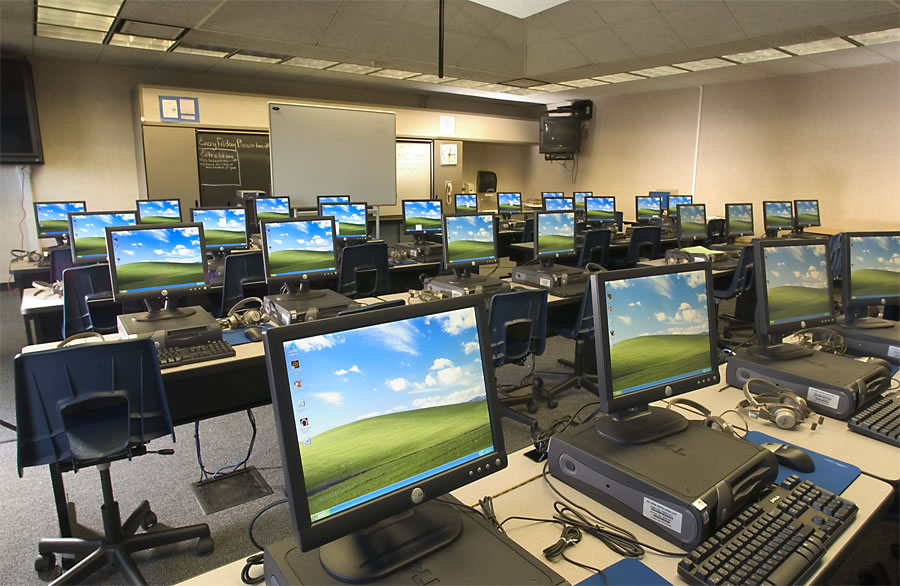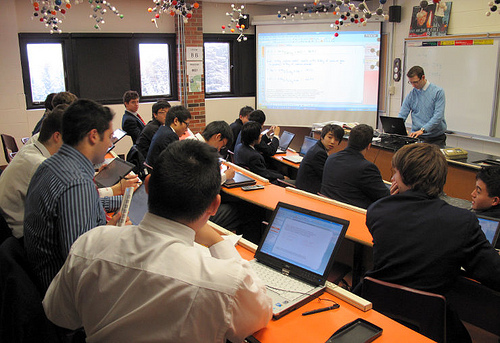|
|
|||||||||||||||||||||||||||||||
|
Five Reasons why Private Schools Produce Tomorrow's Tech Leaders
In recent years, the number of reasons why parents should consider private school education for their children has multiplied By K. Silcox - April 2010. Globalization and technology have changed society, and this necessitates changes in the classroom. School facilities and curriculum need to be constantly updated to allow this strange new 'unknown generation' of students to flourish towards a variety of innovative career paths. In most cases their jobs haven't even been invented yet. Teachers need to foster a sense of global and local identity that will best prepare students to be idea makers in an evolving workplace. Below are five reasons why private schools are best prepared to create the leaders of tomorrow. 1. Some future careers don't exist yet. The world is changing at such a rapid pace it's hard to predict what jobs today's students will be working at tomorrow. Gone is the era where guidance counselors could advise students to pursue careers as lawyers or doctors. Today's students need an environment that encourages creativity and innovation. Much of the equipment and textbooks of public schools, even if only a few years old, is already obsolete for the careers of tomorrow. Students at St. Andrews College in Aurora finish a project using a laptop computer Conversely, many private schools require that their students use laptops the entire school day and update them every two years. This gives students a much different technological base than those who write in a notebook. Private schools chart unexplored areas and constantly discover new software, information sources and media, and how they can be used in the classroom to best serve their students. It is essential that school curriculum step away from traditional career-preparation methods, and instead provide students with skills that can be applied to the future challenges of organizations, the future demands of the market and the future needs of consumers. No one knows where the future will take us, or what we will be doing in the future. The preparation that these students receive may lead them to get an information technology MBA where they will help to create new technologies that will help to further advance our society. Or they may decide to pursue a masters in health administration, in hopes of one day leading an innovative and ground breaking health care facility. Some countries are embracing these changes head on - in Scandanavia, new concepts of team entrepreneurship and logistics innovation are becoming required components of classroom curriculum. There are only a handful of private schools in Canada that are jumping on board at the same pace. Many present day careers are only recent occurrences. The internet is becoming increasingly prevalent, and as a result, many businesses are adopting to the times, which means that they also need to equip themselves security breaches and data theft. Thus, the cyber security degree was born. This is a relatively new field, and there is no shortage of jobs available. As long as businesses use computers, there will be a need for cyber security experts. Click here to investigate some online cyber security programs if you’re interested in a rewarding career in a new field showing no signs of becoming obsolete.
2. Well-rounded students think outside of the box. Private schools are able to tap into a much more diverse array of academic and extracurricular programs than public schools. Private schools allow their students to have a taste of a variety of disciplines - in sciences, technology, and the arts. A number of private schools in Ontario even offer courses in film and video, lighting design, graphic design and web design. As a result, students can pursue photography and social media while developing the technological and communication skills to make their interests more marketable in the future. 3. Students become 'international' citizens of the world. Many private schools have instilled an environment in their schools that allow them to have an international focus in many aspects of their studies. Not only do many private schools (with boarding facilities) house many international students, they also offer a variety of exchange programs, courses with a global outlook, and more foreign language classes. The future knows no borders and students must be exposed to different languages, cultures and ideas. While public schools are often limited to only French courses, the majority of private schools go beyond Canada's official languages and offer Spanish and Mandarin, the emerging languages of global commerce. Studying world issues and participating in mock UN dialogues is a unique way of introducing students to the complexities of international economics, politics and culture. They also have opportunities to learn about global development projects and participate in internationally-focused fundraising. At one all-boys boarding school in Aurora, Ontario, 'community service' has extended to the global community - students raise money for Kiva.org, an innovative microfinance organization, to provide loans to women in the Philipines. In addition, many private schools encourage their students to participate on short-term exchanges to Quebec, Italy and Australia. Life inside a science classroom at St. Andrews College in Aurora Ontario
4. Students start social networks early (in person and online). Private schools are extremely unique in creating a sense of community and comradery. Most have a clan or house system that divides students into a handful of sub-communities. To encourage a sense of local teamwork, points are earned for students and clans in academics, extracurricular activities, community service and school spirit. In addition, although the majority of private schools are single-sex, many have partnerships with opposite sex schools and have joint social events, so students end up networking with other students from a multitude of different schools. They collaborate on social events, extracurricular clubs, plays, academic competitions and sports events. These interactions by far outnumber the networks created at a singular public school and establish life-long friendships and alliances. Finally, with the use of personal laptops, students are encouraged to follow innovative communication methods and utilize social media outlets. 5. Character and emotional development matter. Studies show that students thrive in environments where they feel they have a unique role in respect to their school community. Leadership roles and the pursuit of unique courses and skill sets stimulate creativity and self-confidence. This is especially integral for boys, who need to develop leadership skills, drive and ambition. Boys boarding schools are effective in using the infamous demerit point system to award privileges based on moral judgement and community engagement. They are rewarded for being contributors to their society and for finding a balance between academia, physical health and their artistic endeavours. Private schools also encourage close-knit relationships between teacher/student and promote mutual respect. The Journal of Educational Psychology noted that students are much more likely to perform well on tests when they believe their instructors genuinely care about them. This is also often achieved in private schools because class sizes are on average about half the size of those found in public schools. Photos courtesy of St. Andrew's College, a private school north of Toronto, in Aurora Ontario.
|
|
||||||||||||||||||||||||||||||
|
Website Design + SEO by designSEO.ca ~ Owned + Edited by Suzanne MacNevin | |||||||||||||||||||||||||||||||


